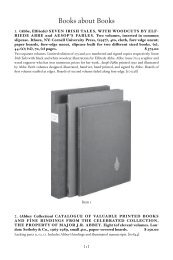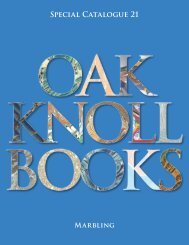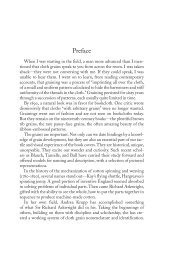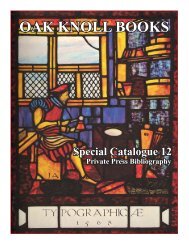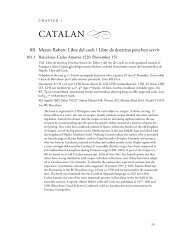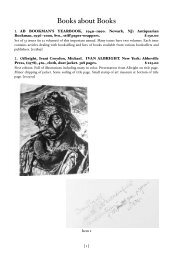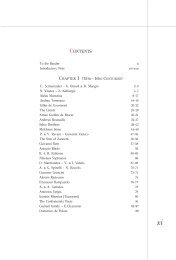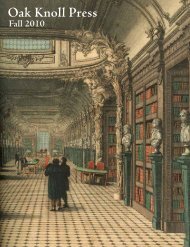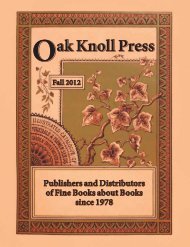Book Design - Oak Knoll Books
Book Design - Oak Knoll Books
Book Design - Oak Knoll Books
You also want an ePaper? Increase the reach of your titles
YUMPU automatically turns print PDFs into web optimized ePapers that Google loves.
34<br />
First edition. Edward Johnston (1872-1944) was a man of letters - master<br />
calligrapher, typeface designer and creator of the lettering and branding<br />
for the London Underground. He was also a great teacher and<br />
philosopher. Many were, and still are, influenced by his down-to-earth<br />
ideas on calligraphy and lettering, and those who studied in his classes at<br />
the Central School of Art and the Royal College of Art in London took his<br />
ideas and views into their own classes and to their own students. Great<br />
calligraphers and letterers of today throughout the world are still<br />
influenced by Edward Johnston's work. This detailed book by art and<br />
design historian Peter Holliday looks afresh at Johnston's work and legacy.<br />
It considers his friendships and his philosophy, the people he worked with<br />
and the influence he had on them and others. Co-published with The<br />
British Library. Sales Rights: Worldwide except in the UK; available in the<br />
UK from The British Library. [Order No. 92516]<br />
161. Berger, Sidney E. EDWARD SEYMOUR AND THE<br />
FANCY PAPER COMPANY: THE STORY OF A BRITISH<br />
MARBLED PAPER MANUFACTURER. New Castle, Delaware:<br />
<strong>Oak</strong> <strong>Knoll</strong> Press, 2006, 6 x 9 inches, hardcover, quarter leather binding with slipcase. 104 pages. ISBN<br />
9781584561897. $150.00 $112.50<br />
This book, limited to an edition of 300 copies, tells the story of Edward Seymour and his firm, The Fancy Paper<br />
Company. This British company manufactured marbled and other decorated (fancy) papers for the bookbinding<br />
and related industries from about 1919 to 1971. With eighteen illustrations showing their methods and copies of<br />
correspondence, and twenty tipped-in, original examples of their many fancy papers, this work is a<br />
well-researched text about one of the last English marbled paper manufacturing firms. Dr. Berger shares with his<br />
readers the vicissitudes of the company's fortunes, the personal lives of its owners, and the often touching<br />
correspondence he found among its business records. The author also informs us of the salaries, costs of doing<br />
business, and the unique demands of bookbinders for the company's products. The work ends with Edward<br />
Seymour's valiant efforts to keep the company afloat in the early 1970s. This edition is published in the best<br />
tradition of the fine press book. It was typeset in hot metal, hand printed on 120 gpm, archival paper, and bound in<br />
quarter leather with slipcase by Manoutios Press of Athens, Greece. [Order No. 90944]<br />
162. Selm, B. van. EEN MENIGHTE TREFFELIJCKE BOECKEN. NEDERLANDSE BOEK-<br />
HANDELSCATALOGI IN HET BEGIN VAN DE ZEVENTIENDE EEUW. Utrecht: HES & DE<br />
GRAAF, 1987, 8vo, cloth. xii, 432 pages. ISBN 9789061943662. $110.00 $82.50<br />
With a summary in English. Study of the Dutch booktrade at the beginning of the 17th century. Awarded with the<br />
Menno Hertzbergerprijs 1991. With 31 illustrations. Sales rights: Available outside North America from HES & DE<br />
GRAAF Publishers. [Order No. 103544]<br />
163. (Yale College Library) Mooney, James E. (editor). EIGHTEENTH-CENTURY CATALOGUES<br />
OF THE YALE COLLEGE LIBRARY. (New Haven, CT): Yale University, 2001, 8to, stiff paper<br />
wrappers. xxi, (224) pages. ISBN 0845731394. $35.00 $26.25<br />
This book reproduces in facsimile each page of the printed catalogues of the Yale College Library issued in 1743,<br />
1755, and 1791, accompanied by an index that identifies authors and titles and is keyed to these facsimile pages.<br />
The introduction tells the story of the early books of this collection from long before there was a Yale College<br />
Library in which to place them. It examines the legend of the "Forty Folios" and describes the major early gifts from<br />
Jeremiah Dummer, Elihu Yale, George Berkeley, and others that made it possible for the new college to build its<br />
collection without spending a cent for books. The use of the books during the 18th century is described and a<br />
comparison is made with similar catalogues of Harvard College. There is a list of selected sources used for this<br />
introduction as a guide for further study. [Order No. 99720]<br />
1-4 books, 25% off 5-25 books, 40% off 26-49 books, 45% off 50+books, 50% off



